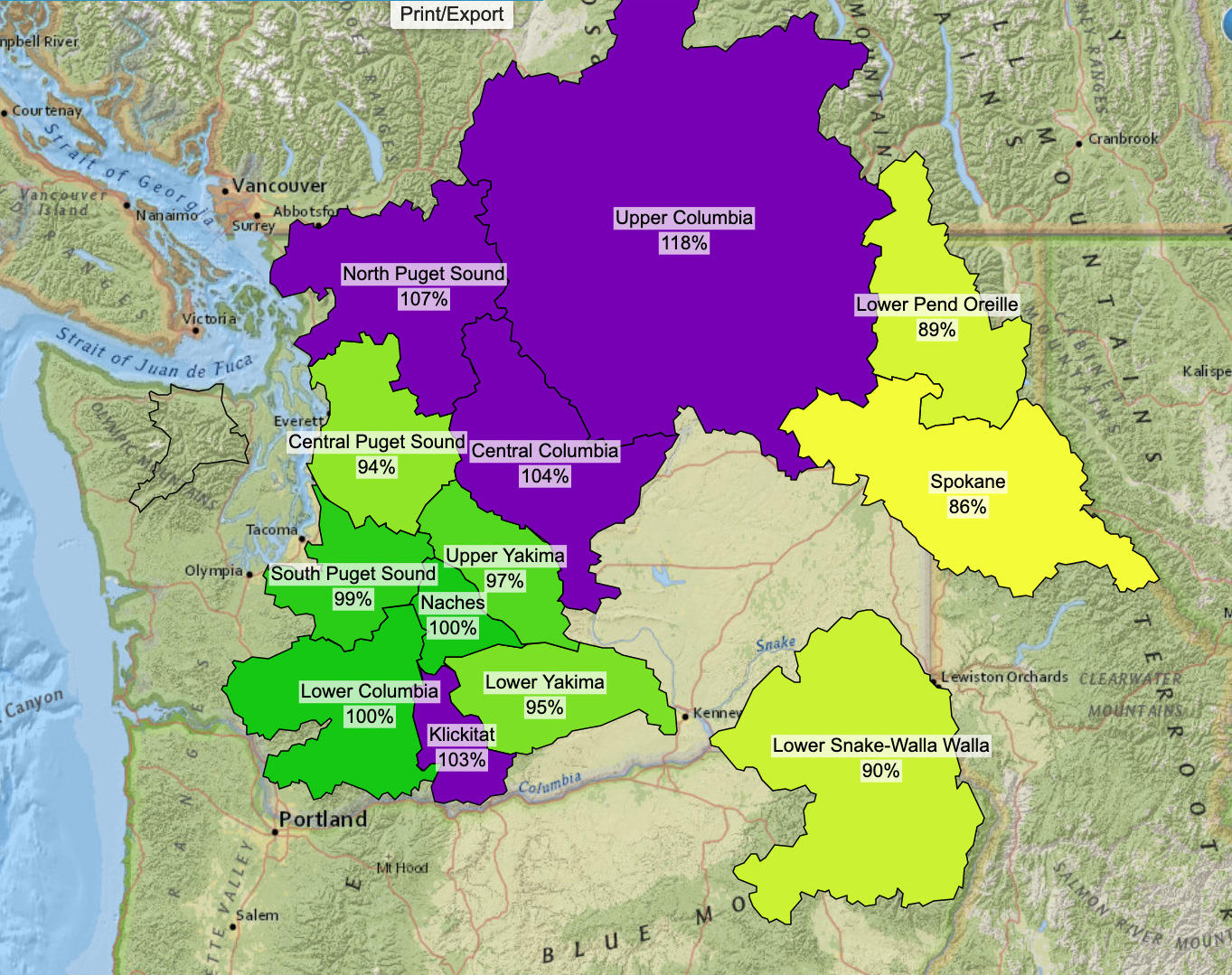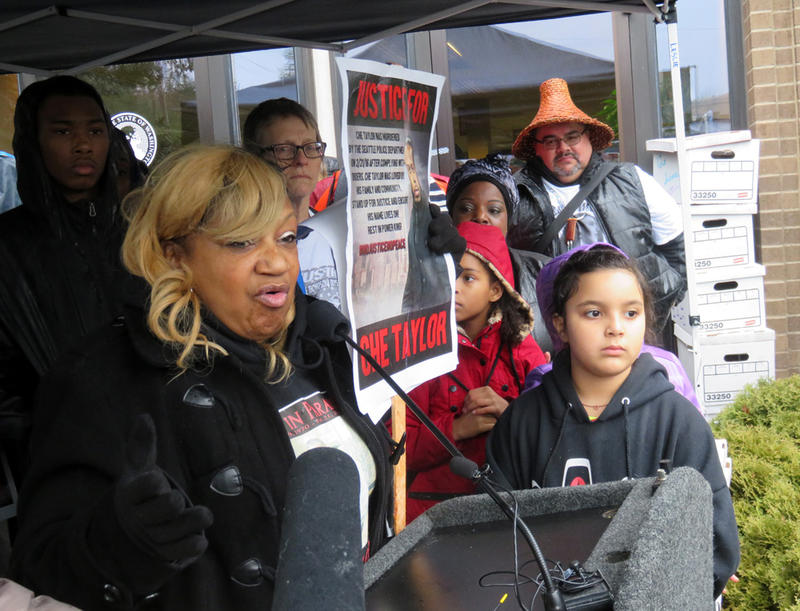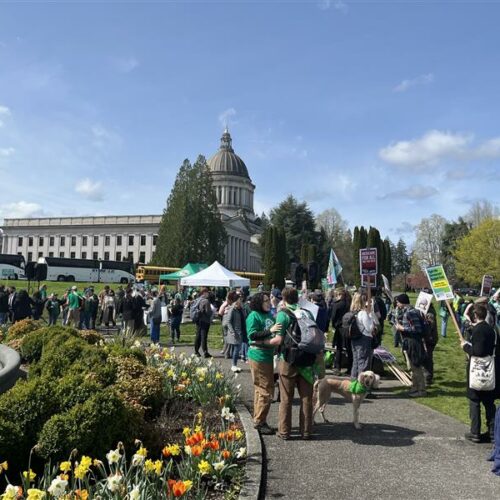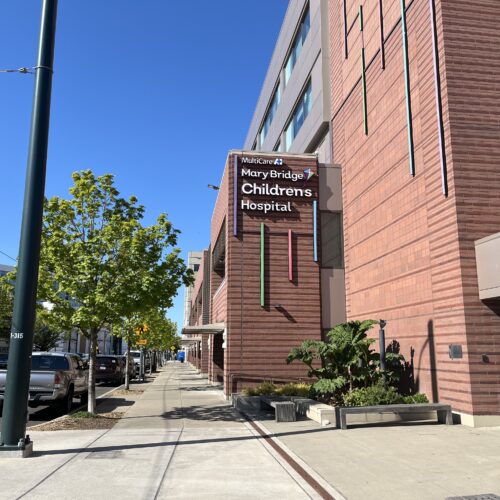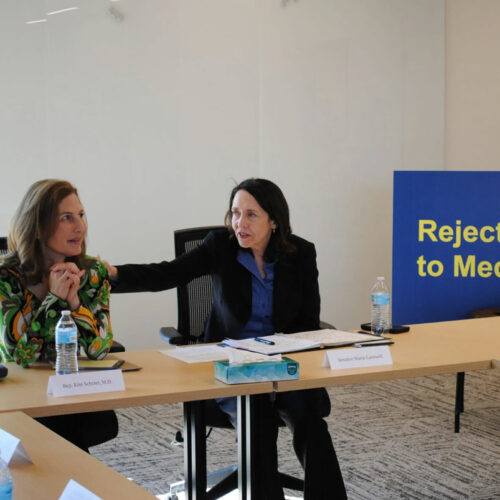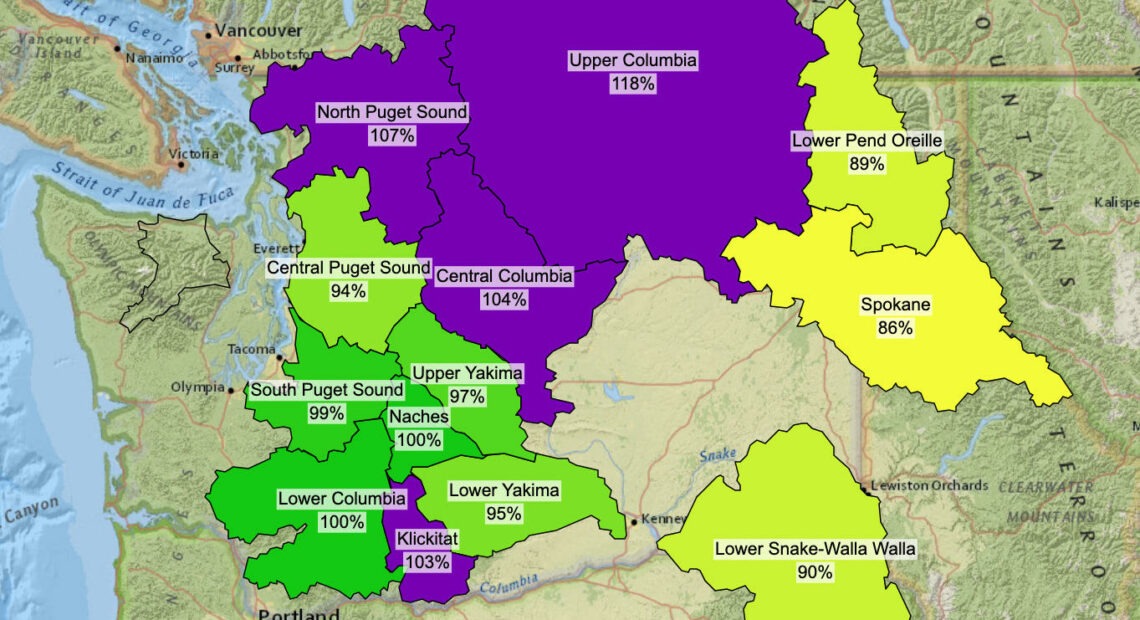
On The Back-End Of Winter, Washington Snowpack Is Generally Normal, With Idaho A Mixed Bag
Listen
With about a month left in winter, Washington’s mountain snowpack is close to or above normal levels. Idaho’s situation is a mixed bag.
Throughout much of Washington, the mid-February snowpack level is between 90% and 110% of the historic averages. That’s true in the Yakima, Puget Sound and lower Columbia River basins. The high-water mark is in the Upper Columbia, which is at 118%.
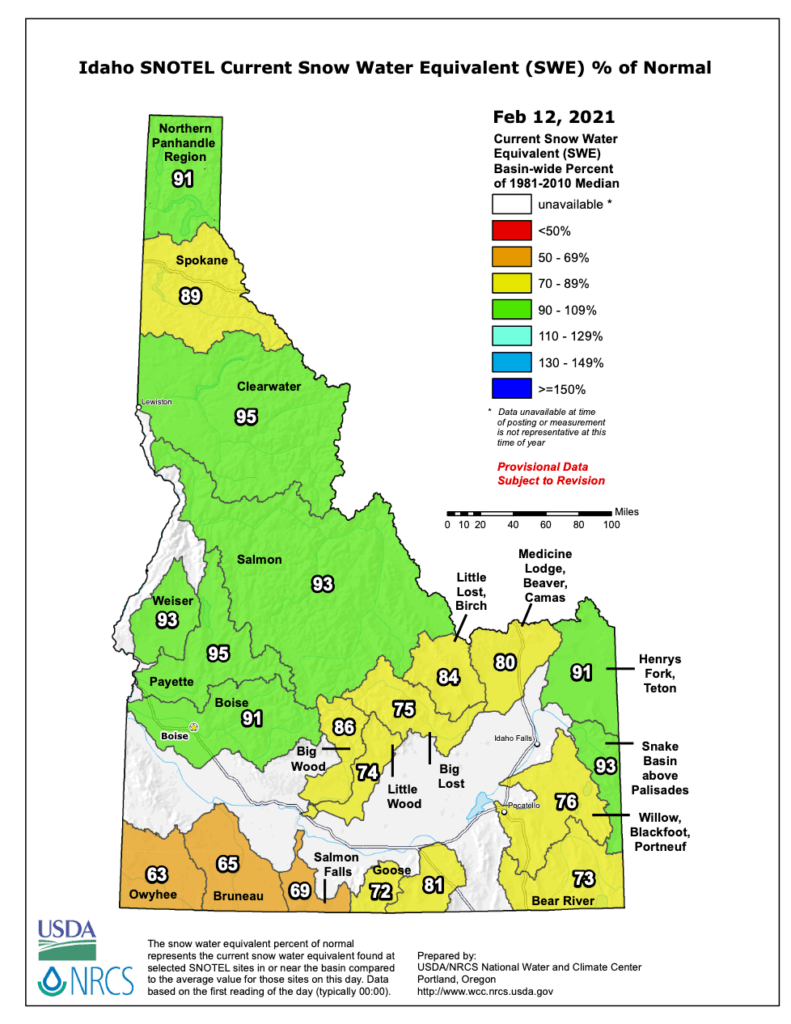
Idaho’s 2021 mid-February snowpack survey shows the southern part of the state is drier than normal. Courtesy of NRCS
As you go east into eastern Washington and northern Idaho, the percentages fall.
“All basins are below normal for precipitation and snowpack, compared to our 30-year average. Northern Idaho is doing pretty well. It’s really the only area in the state that is predicted to have near normal streamflow,” says Erin Whorton, a hydrologist for the Natural Resources Conservation Service in Idaho.
Whorton says southern Idaho’s snowpack situation is much different, with a low of 63% in the Owyhee Basin in the southwest corner of the state. That’s a particular concern because most of the water used to irrigate crops in southern Idaho comes from snowmelt.
But she says the situation began to improve in late January, when a storm dumped multiple feet of snow in northern California. Whorton says that storm also significantly increased southern Idaho’s snowpack.
Related Stories:
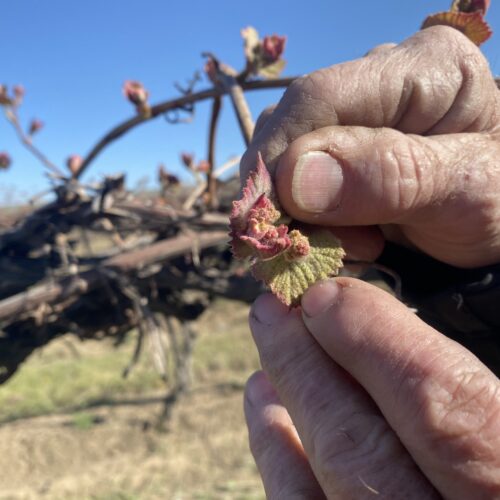
Drought expected to plague farmers in the Yakima Valley, Kittitas areas this summer
Jim Willard shows “bud break” on an old block of concord grapes eight miles north of Prosser, Washington. The baby leaves and buds start pushing out to become grown vines

Early January storms bring much-needed snow to the Northwest – is it enough?
Snow and ice has blasted the lowlands lately but up high where it counts for the rest of the year, snowpack is still a bit thin in parts of Washington
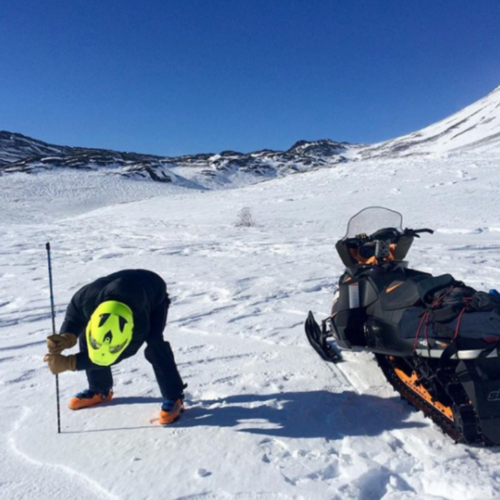
Cascade Snowpack More Vulnerable To Climate Change Than Inland Neighbors, Study Suggests
Smaller, faster-melting snowpack could deplete water supplies, increase wildfire risk and invite invasive species. The Cascades might reach that point earlier.
Listen
Washington voters will likely get to weigh in on police use of deadly force. A ballot measure on that subject turned in around 360,000 voter signatures Thursday afternoon. That should be more than enough to qualify for consideration by the Washington Legislature and then probably go to the statewide ballot in 2018.
Washington currently has one of the highest thresholds in the nation for criminally charging police officers who use deadly force. They are protected as long as they act in “good faith” and without malice. In recent history, county prosecutors in Washington who reviewed controversial police shootings invariably declined to charge any of the officers involved.
Initiative 940 would allow prosecutors to charge a police officer after a deadly shooting using a new “good faith” standard and it calls for ongoing de-escalation and mental health training for officers.
Relatives of people who died in confrontations with police marched triumphantly through the rain to the beat of tribal drums to deliver boxes of petition signatures to the Washington Secretary of State’s office.
Katrina Johnson’s cousin Charleena Lyles was shot by Seattle Police last June.
“The state of Washington has spoken. Enough is enough,” Johnson said. “There is enough blood that has been spilled on these streets and it stops today. We got 360,000 signatures so our loved one’s death will not be in vain,” she said to cheers.
Police officers guilds strongly oppose this initiative. They argue it would change Washington’s standard for prosecution of officers from one of the most protective in the country to one that is highly subjective and “least protective.”
“We feel strongly that changing the Use of Force Law will not reduce violent interactions between law enforcement and the public,” Washington Council of Police and Sheriffs President Craig Bulkley wrote in a public letter. “In fact, it could cause more violence as it ties the hands of police officers, troopers and deputies, and could cost lives.”
“I-940 is bad for communities. It is NOT about training, it’s only intent is to put officers in JAIL,” the Seattle Police Officer’s Guild tweeted earlier this month.
Sisters Uyen Le and Xuyen Le, whose nephew Tommy Le was shot and killed by a King County sheriff’s deputy in June, argued that current policing and accountability policies cannot be allowed to continue.
“Had there been this Initiative 940—de-escalation tactics, the standards for use of deadly force, mental health and first aid training—many innocent lives would have been spared,” Uyen Le said at the signature delivery march.
Because the I-940 campaign turned in well over the minimum 260,000 voter signatures required to qualify a statewide initiative, the Secretary of State’s office can do a random sample check of the signatures. That could take up to a month to complete.
After an initiative to the legislature is certified, elected lawmakers have three options. They can vote to adopt the initiative as proposed and it becomes law without further ado. Lawmakers can also draw up an alternative measure and then both the citizen initiative and the legislature’s alternative go to the voters at the next general election. Or the legislature can reject the initiative or do nothing, in which case the measure automatically goes onto the November statewide ballot.
Washington state lawmakers rarely pass initiatives to the Legislature into law themselves or present alternatives. Legislators punted to the voters on the past 13 initiatives that came before them dating back to 1995.
Leaders of De-Escalate Washington, the campaign organization for I-940, would like for their initiative to be approved during the 2018 legislative session, but realistically expect to be punted to the November ballot.
De-Escalate Washington drew some high-profile backers who made five- and six-figure donations so the campaign could hire paid signature gatherers. Major donors included the Puyallup, Muckleshoot and Tulalip tribes, SEIU and UFCW labor union locals and Seattle venture capitalist Nick Hanauer.
I-940 was one of 70 initiatives to the legislature filed with the Washington Secretary of State this year. The other proposed measures covered a multitude of different subjects from marijuana regulation and health care to car tab fees and term limits for local government officials.
State Elections Division staff do not expect any other campaigns to turn in petitions before Friday’s deadline.
Related Stories:
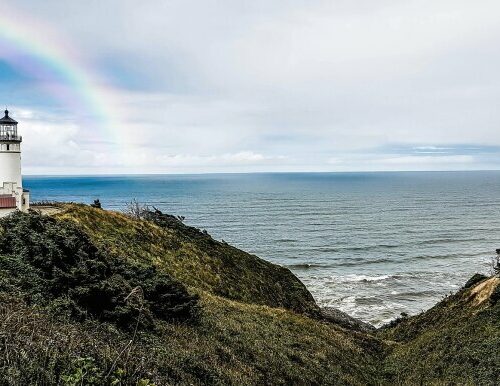
Washington Legislature approves hiking Discover Pass price to $45
The price for a Washington state Discover Pass would rise by $15 later this year, under a bill headed for Gov. Bob Ferguson’s desk.
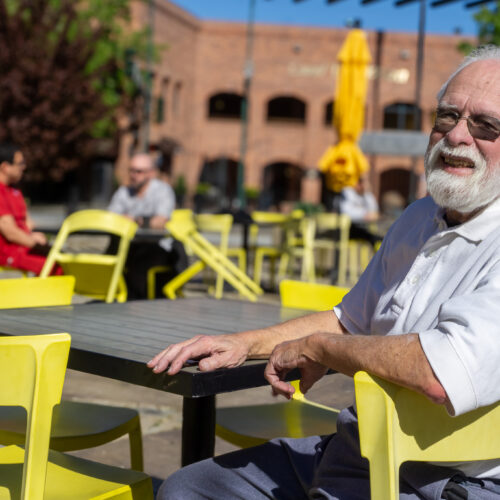
This 86-year-old has officiated 8,000+ games — and counting
Referees and umps don’t often get the spotlight. But the city of Walla Walla has declared today “Vic Walker Day” in honor of one of Washington’s longest tenured school sports officials. He’s helped bring sports to the community for almost six decades.

Pasco couple fondly remembers blessing from Pope Francis
Alexia Estrada and Alberto “Beto” Anguiano, newlyweds from Pasco, Washington, were blessed by Pope Francis last November. (Courtesy: Alexia Estrada and Alberto “Beto” Anguiano) Listen (Runtime: 3:55) Read Here’s a

